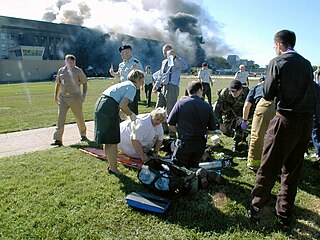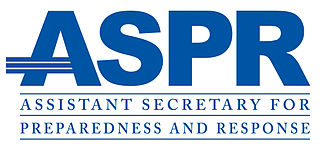Biodefense refers to measures to restore biosecurity to a group of organisms who are, or may be, subject to biological threats or infectious diseases. Biodefense is frequently discussed in the context of biowar or bioterrorism, and is generally considered a military or emergency response term.
The Strategic National Stockpile (SNS), originally called the National Pharmaceutical Stockpile (NPS), is the United States' national repository of antibiotics, vaccines, chemical antidotes, antitoxins, and other critical medical supplies. Its website states:
"The Strategic National Stockpile's role is to supplement state and local supplies during public health emergencies. Many states have products stockpiled, as well. The supplies, medicines, and devices for life-saving care contained in the stockpile can be used as a short-term stopgap buffer when the immediate supply of adequate amounts of these materials may not be immediately available."

The Medical Reserve Corps (MRC) is a network in the U.S. of community-based units initiated and established by local organizations aimed to meet the public health needs of their communities. It is sponsored by the Administration for Strategic Preparedness and Response (ASPR) of the United States Department of Health and Human Services (HHS). The MRC consists of medical and non-medical volunteers who contribute to local health initiatives, such as activities meeting the Surgeon General's priorities for public health, and supplement existing response capabilities in time of emergency. The MRC provides the structure necessary to pre-identify, credential, train, and activate medical and public health volunteers.
Stewart Simonson is the Assistant Director-General of the World Health Organization responsible for the WHO Office at the United Nations and the WHO-US Liaison Office. He also serves as the Director-General's Special Representative for UN Reform. Prior to his assignment in New York, Simonson was the Assistant Director-General for the General Management Group at WHO headquarters in Geneva, Switzerland.

The National Disaster Medical System (NDMS) is a federally coordinated disaster medical system and partnership of the United States Departments of Health and Human Services (HHS), Homeland Security (DHS), Defense (DOD), and Veterans Affairs (VA). The purpose of the NDMS is to support State, local, Tribal and Territorial authorities following disasters and emergencies by supplementing health and medical systems and response capabilities. NDMS would also support the military and the Department of Veterans Affairs health care systems in caring for combat casualties, should requirements exceed their capacity. The NDMS was established in 1984.

Signed into effect on 12 June 2002, the Public Health Security and Bioterrorism Preparedness and Response Act of 2002 (PHSBPRA) was signed by the President, the Department of Health and Human Services (DHHS) and the U.S. Department of Agriculture (USDA).

The Project Bioshield Act was an act passed by the United States Congress in 2004 calling for $5 billion for purchasing vaccines that would be used in the event of a bioterrorist attack. This was a ten-year program to acquire medical countermeasures to biological, chemical, radiological, and nuclear agents for civilian use. A key element of the Act was to allow stockpiling and distribution of vaccines which had not been tested for safety or efficacy in humans, due to ethical concerns. Efficacy of such agents cannot be directly tested in humans without also exposing humans to the chemical, biological, or radioactive threat being treated, so testing follows the FDA Animal Rule for pivotal animal efficacy.

Disaster medicine is the area of medical specialization serving the dual areas of providing health care to disaster survivors and providing medically related disaster preparation, disaster planning, disaster response and disaster recovery leadership throughout the disaster life cycle. Disaster medicine specialists provide insight, guidance and expertise on the principles and practice of medicine both in the disaster impact area and healthcare evacuation receiving facilities to emergency management professionals, hospitals, healthcare facilities, communities and governments. The disaster medicine specialist is the liaison between and partner to the medical contingency planner, the emergency management professional, the incident command system, government and policy makers.

The Biomedical Advanced Research and Development Authority (BARDA)' is a U.S. Department of Health and Human Services (HHS) office responsible for the procurement and development of medical countermeasures, principally against bioterrorism, including chemical, biological, radiological and nuclear (CBRN) threats, as well as pandemic influenza and emerging diseases. BARDA was established in 2006 through the Pandemic and All-Hazards Preparedness Act (PAHPA) and reports to the Office of the Assistant Secretary for Preparedness and Response (ASPR). The office manages Project BioShield, which funds the research, development and stockpiling of vaccines and treatments that the government could use during public health emergencies such as chemical, biological, radiological or nuclear (CBRN) attacks.

Irwin Redlener is an American pediatrician and public health activist who specializes in health care for underserved children and disaster planning, response, and recovery. He is the author of The Future of Us: What the Dreams of Children Mean for 21st Century America (2017) and the author of Americans at Risk: Why We Are Not Prepared for Megadisasters and What We Can Do Now (2006).

The Administration for Strategic Preparedness and Response (ASPR) is an operating agency of the U.S. Public Health Service within the Department of Health and Human Services that focuses preventing, preparing for, and responding to the adverse health effects of public health emergencies and disasters. Its functions include preparedness planning and response; building federal emergency medical operational capabilities; countermeasures research, advance development, and procurement; and grants to strengthen the capabilities of hospitals and health care systems in public health emergencies and medical disasters. The office provides federal support, including medical professionals through ASPR’s National Disaster Medical System, to augment state and local capabilities during an emergency or disaster.

On December 19, 2006, the Pandemic and All-Hazards Preparedness Act (PAHPA), Public Law No. 109-417, was signed into law by President George W. Bush. First introduced in the House by Rep. Mike Rogers (R-MI) and Rep. Anna Eshoo (D-CA), PAHPA had broad implications for the United States Department of Health and Human Services's (HHS) preparedness and response activities. Among other things, the act amended the Public Health Service Act to establish within the department a new Assistant Secretary for Preparedness and Response (ASPR); provided new authorities for a number of programs, including the advanced development and acquisitions of medical countermeasures; and called for the establishment of a quadrennial National Health Security Strategy.
PublicHealthEmergency.gov is a web portal created by the U.S. Department of Health and Human Services to serve as a single point of entry for access to public health risk, and situational awareness information when the President or the Secretary of Health and Human Services exercise their public health emergency legal authority. This site acts as a portal for residents in the U.S. and worldwide to obtain information from all U.S. federal agencies involved in a public health emergency, a medical disaster or the public health aspects of a natural or man-made disaster.

Nicole Lurie is an American physician, professor of medicine, and public health official. During the administration of President Barack Obama, she was Assistant Secretary for Preparedness and Response (ASPR) at the United States Department of Health and Human Services (HHS) from 2009 through the end of the president's second term. The mission of the Office of the Assistant Secretary for Preparedness and Response is to "lead the nation in preventing, responding to and recovering from the adverse health effects of public health emergencies and disasters, ranging from hurricanes to bioterrorism."
Biosecurity in the United States is governed by the Bureau of Western Hemisphere Affairs, which is part of the US Department of State. It obtains guidance and advice on specific matters relating to biosecurity from various other government agencies.

The Pandemic and All-Hazards Preparedness Reauthorization Act of 2013 is a law enacted by the 113th United States Congress. The Act amends the Public Health Service Act in order to extend, fund, and improve several programs designed to prepare the United States and health professionals in the event of a pandemic, epidemic, or biological, chemical, radiological, or nuclear accident or attack. The Act clarifies the authority of different American officials, makes it easier to temporarily reassign personnel to respond to emergency situations, and alters the process for testing and producing medical countermeasures. The Act is focused on improving preparedness for any public health emergency.

The Emergency Care Coordination Center (ECCC) is the policy home for the emergency care community within the federal government. It is charged with strengthening the U.S. response systems to better prepare for times of crisis. It was established in January 2009.

The Strengthening Public Health Emergency Response Act of 2015, H.R. 3299, is a bill introduced in the U.S. House of Representatives that would streamline government decisions and provide incentives for vaccines and treatment of dangerous pathogens and diseases. The bill was introduced by Representatives Susan Brooks (R-IN) and Anna Eshoo (D-CA).

The Alliance for Biosecurity is a consortium of companies that develop products to respond to national security threats, including bioterrorism pathogens and emerging infectious diseases. It is headquartered in Washington DC.

The Promoting Resilience and Efficiency in Preparing for Attacks and Responding to Emergencies Act, or PREPARE Act, of 2017 is a bill introduced in the United States House of Representatives by U.S. Representative Dan Donovan. The bill would assist American attempts to protect the nation from potential terror attacks and fortify emergency response capabilities through reauthorizing grants for programs that are necessary for disaster relief.









